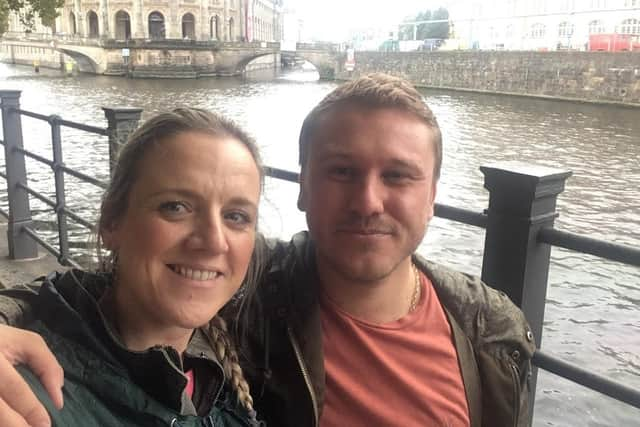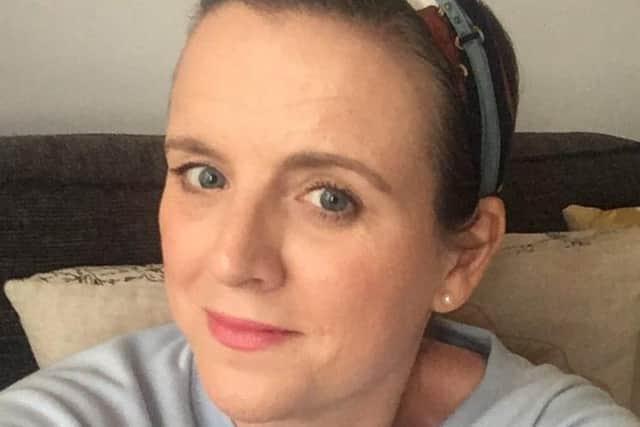Bedford woman shrank in height after incurable cancer missed FOR A YEAR
and live on Freeview channel 276
A Bedford woman whose incurable blood cancer was MISSED FOR ALMOST A YEAR despite shrinking by 8cm has vowed to ensure others don’t live through the same nightmare.
Sarah Myers, 40, was told her back pain and repeated chest infections were caused by asthma.
Advertisement
Hide AdAdvertisement
Hide AdBut by the time she was finally diagnosed with myeloma – an incurable blood cancer which claims the lives of 3,000 people in the UK each year – she had lost 8cm in height and had holes in the bones of her legs, sternum and pelvis.
She was just 37 years old.
Sarah is now one of the brave patients sharing their story as part of Myeloma Awareness Week to help others watch out for the tell-tale signs of this hidden blood cancer.
She said: “My life was changed forever. It was shocking. You can never be the carefree person you were before.
“On the one hand, you get a sense of relief to know what was actually going on but, equally, I was 37 – so, pretty young to have myeloma. Never in my dreams did I think this back pain was cancer.”


Advertisement
Hide AdAdvertisement
Hide AdShe added: “When I was diagnosed and they measured me, I remember thinking, ‘It’s not my height’. I was 5ft 8in and I’m noticeably shorter now.
“I try to be stoic about it but some days it’s really tough. I went undiagnosed for a long time. If it had been diagnosed sooner, perhaps the damage to my bones wouldn’t have been so significant.
“I’ve a bit more mobility now and there’s a glimmer of normality coming back but it will never be the same. Bending down to put shoes and socks on is very difficult – all these things I used to do and take for granted.”
Myeloma occurs in the bone marrow and tends to affect people over 65.


Advertisement
Hide AdAdvertisement
Hide AdWhile it is incurable, myeloma is treatable in the majority of cases.
Despite being the third most common type of blood cancer, it is especially difficult to detect as symptoms, including back pain, easily broken bones, fatigue and recurring infection, are often linked to general ageing or minor conditions.
Yet, a simple blood test can, in most cases, pick up signs of myeloma.
Patients like Sarah experience significant delays in getting diagnosed, with 50% waiting over five months.


Advertisement
Hide AdAdvertisement
Hide Ad34% of myeloma patients visit their GP at least three times before getting a diagnosis.
Sarah began experiencing back pain in December 2017 after helping with an office move but initially put it down to overexertion.
A few days later, she got an “awful chest infection” she just couldn’t shake and visited her GP.
She grew more and more exhausted and the back pain worsened.
Advertisement
Hide AdAdvertisement
Hide AdWhen she came down with another chest infection in April 2018, she went back to her GP but was treated “like a time-waster”.
She said: “The GP wasn’t very interested. Possibly because my symptoms presented as other things and I didn’t fit the typical demographic for myeloma.
"I could barely stand and walk. My breathing was ragged. I was so worn out. It was staggering that she sent me away in that state.
"But the idea that it was something more serious was never entertained.”
Advertisement
Hide AdAdvertisement
Hide AdThree days later, her mother took her to A&E where she was diagnosed with asthma and prescribed an inhaler. But it did little to help relieve her “shallow breathing”.
She kept telling her doctor she didn’t think she had asthma as nothing was working. The back spasms kept flaring up along with the chest pain.
Alarmed at Sarah’s fast-deteriorating health, her brother asked a neighbour – who happened to be a haematologist – to take a look at her blood tests. Thanks to his help, she was fast-tracked and got a referral to Addenbrooke's Hospital in Cambridge.
She started treatment a year after first experiencing symptoms. Sarah is now on her third round of treatment and has a rod in her leg.
Advertisement
Hide AdAdvertisement
Hide AdAnd she gave this warning to others: “You know your own body and when things aren’t right with it. Don’t be fobbed off by anyone who says it’s not anything serious.
“If you feel something isn’t right – an infection isn’t getting better, or the pain has been hanging around for too long – you really need to push for a second opinion or to see a specialist.”
